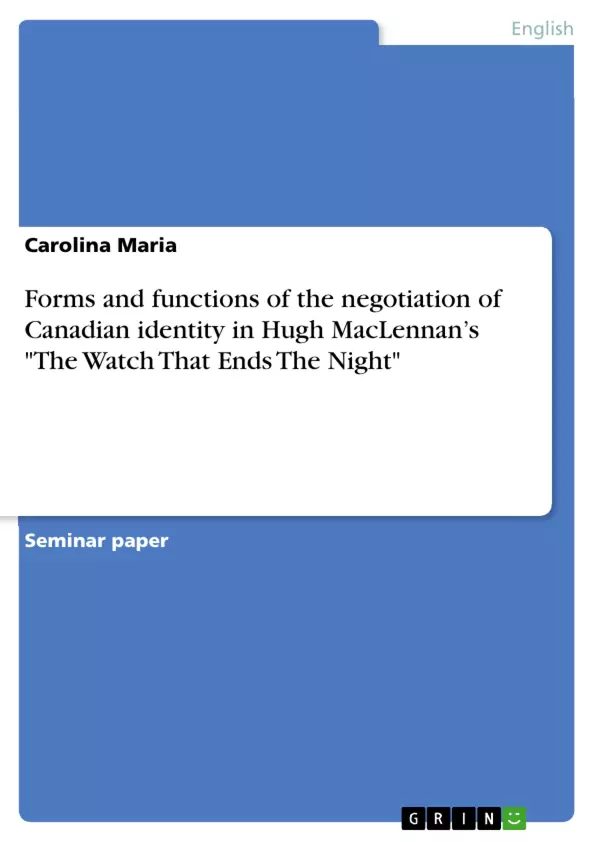This paper examines the way in which Hugh MacLennan incorporates elements of Canadian identity into his renowned novel The Watch That Ends The Night.
Firstly, an attempt to define the terminology that is essential for the understanding of this paper will be made. Moreover, rather complex phenomena such as ‘identity’ or ‘nation’ will be briefly discussed whilst taking into account influential works such as Anderson’s Imagined Communities. Having introduced the terminology, this paper will be concerned with the question of how these concepts can be applied to the situation in Canada. On that point, the relevance of national identity for Canada will be debated. In order to do so, Canadian nationalism will be taken into consideration. Then, MacLennan’s The Watch That Ends The Night will be examined, taking into account the different elements of identity constitution to be found in the novel. Thereby, the aspects of Canadian identity will revolve around the main themes of history, politics and religion.
The significance of the thematization of national identity in MacLennan's novel shall be discussed as well as the novel’s impact.
The central thesis of this paper is that in his The Watch That Ends The Night, Hugh MacLennan utilizes Canada’s involvement in an international conflict as well as the nation’s history during the early twentieth century in order to establish a sense of national identity among the readers.
Inhaltsverzeichnis (Table of Contents)
- Introduction
- Methodology
- Current state of research
- What is (national) identity?
- Definitions, explanation of theoretical framework
- National identity and nationalism in Canada
- Aspects of Canadian Identity in The Watch That Ends The Night
- History
- World War 2 as an international conflict
- Post-colonialism and distinction from Great Britain
- Political idealism in the 1930s
- Religion
- The role of faith in The Watch That Ends The Night
- History
Zielsetzung und Themenschwerpunkte (Objectives and Key Themes)
This paper aims to analyze the forms and functions of the negotiation of Canadian identity in Hugh MacLennan's novel *The Watch That Ends The Night*. It examines how the novel uses elements such as history, political idealism, and religion to explore and shape the evolving sense of national identity in Canada during the early twentieth century. The key themes are:- The role of literature in shaping national consciousness and identity
- The impact of international conflicts and post-colonialism on Canada’s self-perception
- The significance of the past and its influence on individual and national identities
- The interplay of political ideals and social realities in shaping national identity
- The role of religion in navigating personal and collective crises of faith and identity
Zusammenfassung der Kapitel (Chapter Summaries)
This preview focuses on the first three chapters of the book and avoids any content from the conclusion or final chapter to avoid spoilers. The introduction discusses the methodology of the paper and its current state of research. The paper then examines the complex concept of identity and its relevance for the Canadian context, exploring definitions of national identity and nationalism. Chapter 1 delves into the various aspects of Canadian identity present in *The Watch That Ends The Night*, including historical references, political idealism of the 1930s, and the impact of religious faith. Chapter 2 focuses on the historical context of the novel, specifically Canada’s involvement in World War II and its evolving relationship with Great Britain. Chapter 3 examines the political landscape of Canada during the 1930s, exploring the rise of the communist party and its influence on the characters. Chapter 4 examines the role of religion and its impact on the characters’ individual and collective identities.Schlüsselwörter (Keywords)
The main keywords and focus topics of the text are: Canadian identity, national identity, nationalism, post-colonialism, World War II, political idealism, religion, faith, literature, Hugh MacLennan, *The Watch That Ends The Night*.Frequently Asked Questions
What is the main theme of 'The Watch That Ends The Night'?
The novel explores the negotiation of Canadian national identity through history, politics, and religion during the early twentieth century.
How does Hugh MacLennan use World War II in his novel?
MacLennan uses Canada's involvement in the international conflict of WWII to establish a sense of national consciousness and identity among readers.
What political aspects are discussed in the book?
The paper examines the political idealism of the 1930s, including the rise of the communist party and its influence on Canadian social reality.
What role does religion play in the novel?
Religion is analyzed as a means for characters to navigate personal and collective crises of faith, contributing to their sense of identity.
How does post-colonialism affect Canadian identity in the text?
The study explores Canada's evolving relationship with and distinction from Great Britain as part of its post-colonial identity formation.
- Arbeit zitieren
- Carolina Maria (Autor:in), 2022, Forms and functions of the negotiation of Canadian identity in Hugh MacLennan’s "The Watch That Ends The Night", München, GRIN Verlag, https://www.grin.com/document/1223589



